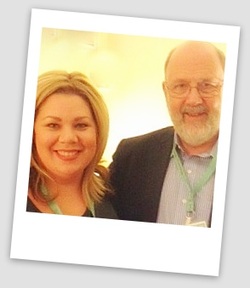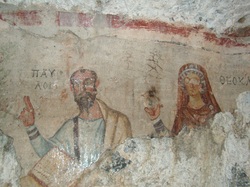|
|
 Last week I was in Baltimore for the annual, Society of Biblical Literature and American Academy of Religion meeting. Thanks to an invitation from my new BFF Joel Watts, I joined a small gathering of bible bloggers for an intimate conversation with N.T. Wright on his latest 1700 page tome, “Paul and the Faithfulness of God.” In the two volume work, Wright sets forth to discuss Paul in terms of God, the people of God and the future of the people of God through the Jewish theological lenses of monotheism, election and eschatology. Throughout, Wright reminds us these are the central Jewish themes Paul is rethinking through Jesus and Spirit. To understand Paul’s worldview, Wright masterfully situates Paul within the three realms of his universe, Jewish, Greek and Roman Empire. With a twinkle in his eye, sipping hot tea as he tries to recover from a brutal travel schedule, Wright reminds us that he is offering Paul as a “refreshed” Jewish thinker who is refocusing Jewish theology around Jesus and Spirit. We lean forward, hands feverishly typing his every word into our devices, he argues Paul did this thinking in the service of his mission, to plant communities of Jesus followers in Caesar’s world who would be shaped by the gospel and carry this gospel out to the world. Though Paul is not a systematic theologian, for Wright, he is on league with Plato and Aristotle in his ability to take abstract concepts, argue with passion and understand these concepts in ways that pertain to faith. I am struck again at this original pastor/scholar who is able to communicate high ideals in practical ways to a given context for the good of God’s church. Wright leans back, hands folded like church and steeple and says, “Philosophy, religion and politics are all reconciled in Paul.” My thumbs typing at a dizzying speed, I take notes on my i-phone, I do not want to miss a single syllable of this diatribe—this modern day pastor/scholar whom I have read through formative years, whose words helped me know Jesus. I am at once caught, head finds heart and my eyes flood with tears as Wright explains why he began the work with the letter to Philemon; tells us to listen for echoes of the Exodus in the short letter regarding Onesimus, slave and convert of Christ. Slavery was a complicated and delicate social relationship in the ancient world, as was marriage, the role of women, the chasm of Jew and Gentile. As I read through this work, words dance off the page as Wright gives us Paul, arms stretched out in cross formation to master and slave and call them to be reconciled. Not only here but to the women of Philippi, Euodia and Syntyche, to Jews and Gentiles, this is the heart of Paul’s gospel; be reconciled in Christ Jesus. I am reminded again why scholarship matters, why I have spent my life pouring over ancient manuscripts and why I am always captivated at the discovery of some stele or antiquated fragment. I remember why I have decided to occupy my days with Paul and Jesus and the women who served with them; it is-- all of it-- for the good of the church and the ministry of reconciliation.
4 Comments
 I was in junior high school the first time it happened, all arms and legs, moods swinging in the rafters, pimples and crazy, curly hair. Awkward and overly dramatic as I was, I still found myself beautiful, found life worth the effort. I owe this sense of self, of course, to two loving parents and Seventeen magazine. In the early days, all I knew was I could do anything, there were no limitations according to my gender, self or person—hard work, determination and sheer will could carry me down whatever path I chose, to say nothing of the power of God. The first time this notion was challenged, I was twelve and attempting to play touch football with our pastor and some guys in my church. In Tennessee all of us grow up tossing the ball around, rolling in the grass, laughing in the warm autumn sun. So the game called by my pastor was no different than those games I had played with my cousins and other friends so many times before; only-- it was. This time both teams were made up of men and boys with the exception of me. This wouldn’t have been so bad except the pastor/quarterback wouldn’t throw the ball to me. In fact, he threw the ball over my head more than a few times though I was open with little or no coverage. Now I’m the first to admit I have always been more suited for an afternoon in the mall than to play running back, but, I was a really fast runner, had a God given talent, and everyone knew it—why wouldn’t he give me a chance? Why was he treating me differently; why was he playing the game as if I wasn’t there? Why were my gifts and graces being discounted? Over the years, I have become aware that these emotions live just under the surface for me and for many other women called to and equipped for ministry. Through years of study and I believe, under guidance of the Spirit, I have come to understand these emotions were also palpable and formational in the life and ministry of the apostle Paul, who was after all, not one of the original 12. As a woefully misunderstood Biblical and historical figure, second only to Jesus in this, the apostle Paul will struggle both with the lack of human validation and at the same time, his certainty of divine sending. Over the course of the next few weeks, this blog will engage with Pauline and Deutero- Pauline texts to determine how the story of the apostle’s own life and call impacted his teaching on God’s call and an egalitarian-gifts based approach therein. I will search out and demonstrate how the ostracized and criticized apostle spent his life fighting for what he confesses in Galatians, “There is no longer any Jew or Greek, slave or free, male or female, for you are all one in Christ Jesus.” I hope you will join me! I welcome your insights, comments and questions. |
Subscribe Today for Free GiftBLOG
Archives
June 2019
Categories
All
|

 RSS Feed
RSS Feed